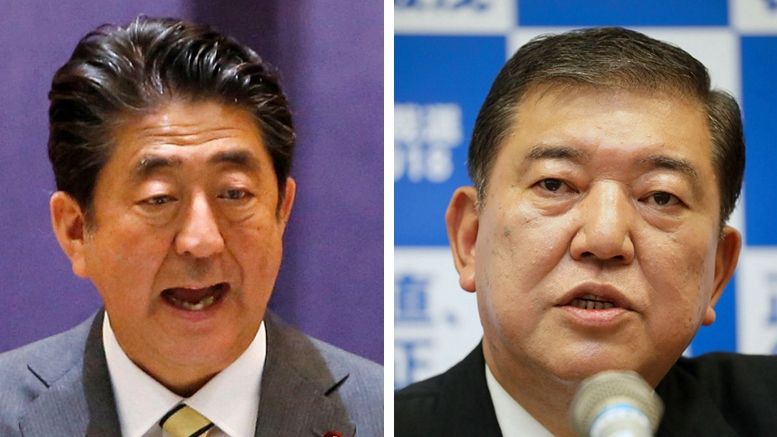
(Photo: CGTN)
Japanese Prime Minister Shinzo Abe on Friday filed his candidacy for the ruling Liberal Democratic Party (LDP) leadership election scheduled on September 20, announcing a two-way race with former Defense Minister Shigeru Ishiba.
Here are four things that you need to watch for the coming election.
Why the election matters and how it works?
Japan’s ruling LDP party holds a leadership election every three years. The winner automatically becomes prime minister because of its majority in both houses of parliament.
Nobody challenged Abe in 2015, so the first contested party election since 2012 is expected to take place on September 20.
In the first round of voting, the contenders will aim to secure a majority among 810 votes – 405 by lawmakers and the same number by rank-and-file members. If none of them wins a majority in that stage, a run-off will be held in which ballots by Diet members weigh more.
The LDP limits its president to three terms.
If the 63 year-old-age Abe wins, he would be ensured a third term and last term as president and be on track to become Japan's longest-serving leader, continuing until the 2020 Tokyo Olympics and beyond.
For Ishiba, who is 61, the election would amount to a "revenge match" against Abe, to whom he had narrowly lost in the 2012 presidential election.
Could Abe score a landslide victory?
Although polls suggest the election has already ended before beginning as Abe got majority support among party's lawmakers, analysts believed it remains unclear whether Abe can score landslide victory.
If Abe wants to have greater freedom to carry out his policy agenda, including constitutional revision, before his time in office is done, he has to win more votes from Diet members.
Abe already has the backing of five of seven LDP factions representing 257 parliamentary votes. Mr. Ishiba’s bloc accounts for just 20 parliamentarians.
Meanwhile, it would also be embarrassing for Abe if his support from the grassroots lagged significantly behind his support from the parliamentary party.
Abe's campaign staffs said they will step up efforts to phone party members across the country to ask them to vote for the prime minister in the election.
Will grassroots stand by Ishiba this time?
Ishiba has long sought to cast himself as a voice of the regions. In 2012, 55 percent of the local votes went to Ishiba, while 29 percent went to Abe. Can Ishiba reproduce a similar result?
Abe has been plagued by land sale scandal, but his approval ratings have recovered against a backdrop of summits with US president Donald Trump letting the prime minister present himself as an active champion of Japan’s interests on trade and the DPRK.
Asahi public polls suggested, in 2012 only 18 percent supported Abe, and currently that number has risen to 54 percent approval.
Meanwhile, some senior members of LDP local chapters said that rank-and-file members are less interested in the presidential race because they believe Abe will undoubtedly win, expressing concerns that voter turnout may be low.
What are the key issues of the two-way race?
Abe and Ishiba have decided to refrain from carrying out campaign activities for a few days after a deadly earthquake rocked Japan's northernmost main island of Hokkaido on Thursday.
A total of three one-on-one debate sessions between candidates will be held during the campaigning period and two candidates' policy differences will be highlighted during the debate.
Whether the war-renouncing Article 9 of the constitution should be revised would be a major issue.
Japanese Prime Minister Shinzo Abe smiles as he receives a bouquet after announcing his candidacy for the ruling Liberal Democratic Party (LDP) leadership election in Tarumizu, Kagoshima Prefecture, Japan in this photo taken by Kyodo on August 26, 2018. /VCG Photo
Abe wants to make sure LDP's proposal on amendments to the supreme law will be submitted to an extraordinary Diet session to convene this coming autumn while Ishiba calls for careful discussions on constitutional revisions with other political parties.
On economic policy, Abe strived to show the benefits of "Abenomics" policy package including upbeat corporate performances, especially those of large companies, and increasing job availability.
Ishiba criticized said regional economies have not benefited from Abe's policy and new steps are needed to boost them.
As for foreign affairs, Abe is expected to stick with his policies, including maintaining close ties with the US and a hardline stance against the DPRK.
Japan has never had diplomatic relations with the DPRK. Ishiba has proposed establishing a liaison office in Pyongyang that would have the task of negotiating with the DPRK to secure the return of Japanese citizens it abducted in the 1970s and 1980s.


